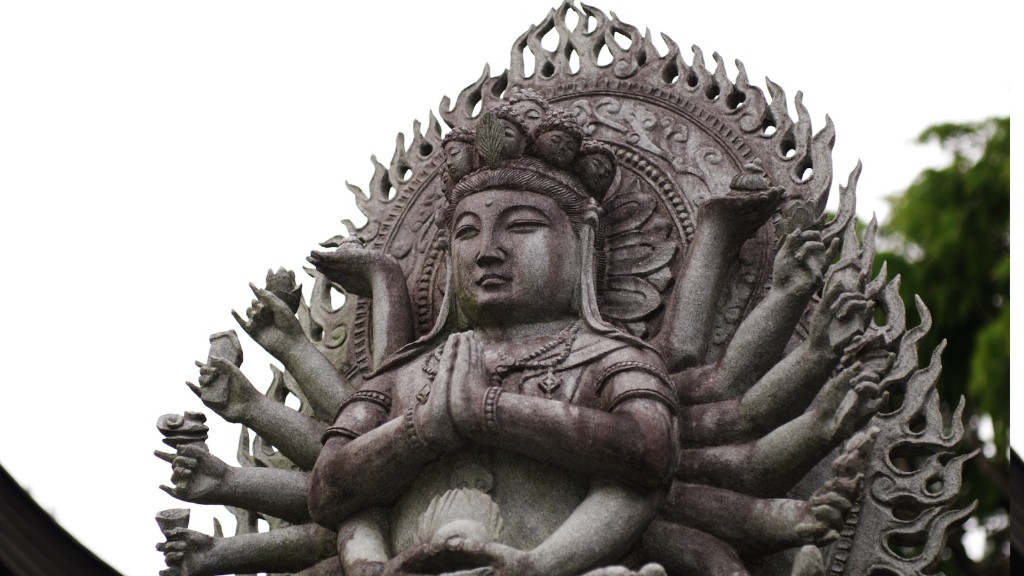Beliefs
Hinduism is a vast and complex belief system. It is often said to be the oldest and most complex of the world’s major religions, although it is also said to be one of its most misunderstood. In Hinduism, the Supreme Being is viewed as formless, infinite and ultimately unknowable. Most Hindus believe in a pantheon of gods, although they acknowledge that there is a single Supreme Being, Brahman, behind them all. Brahman is behind and within everything and everyone in the universe, transcending the boundaries of time, space and physical manifestation.
Hinduism is a polytheistic religion, with millions of gods and goddesses, each representing an aspect of Brahman. Individual gods such as Vishnu, Shiva and Kali are usually associated with certain forms of power or energy. Many Hindus also believe that a soul can be reincarnated into different physical bodies, depending on its karma and level of spiritual enlightenment.
The goal of a Hindu is to achieve liberation from the cycle of rebirth and ultimately reunite with the Supreme Being. To do this, Hindus must achieve ‘moksha’, the release from the bondages of karma and the material world. This can be achieved through a spiritual journey of devotion, which is known as Bhakti Yoga. This involves worshipping the gods and goddesses, performing rituals and living an ethical life.
Scriptures
Hinduism has no single, authoritative scripture. Instead, it is based on a large body of sacred texts, collectively known as the Vedas. These texts contain a variety of teachings, including philosophical and moral precepts, as well as ceremonies and rituals. The Upanishads are also considered part of the Vedic canon, as are the Bhagavad Gita, the Mahabharata and the Ramayana. Other sacred texts are the Puranas and the Yoga Sutras of Patanjali.
The Vedas are divided into four main categories: Rig Veda, Yajur Veda, Sama Veda, and Atharva Veda. The Rig Veda contains hymns and verses that are used in religious ceremonies and rituals. The Yajur Veda contains mantras and liturgies used during ceremonies and rituals. The Sama Veda maintains melodies used in religious chanting. The Atharva Veda consists of prayer, charms, and incantations.
The other Vedas are collections of commentaries and discussions of the four main Vedas. The Upanishads expound upon the philosophy and beliefs of the Vedas, while the Bhagavad Gita is an ethical guide for living. The Mahabharata is an epic poem about the battle between Pandava and Kaurava princes, and the Ramayana is an epic tale of the trials and tribulations of Rama and Sita.
Pillars
Hinduism is based on some core concepts and beliefs, and the four main pillars of Hinduism are dharma, karma, samsara, and moksha. Dharma is the path of spiritual and moral conduct for all Hindus. It provides guidelines for ethical behavior and spiritual practice. Karma is the law of cause and effect, and it explains that all actions have consequences, both positive and negative.
The cycle of birth and death is known as samsara, and moksha is the ultimate release from this cycle and the attainment of spiritual liberation. Hindus believe that through spiritual practice and observance of their dharma, they can achieve moksha and escape the cycle of reincarnation.
Religious Practices
The religious practices of Hinduism are deeply associated with its beliefs and scriptures. Hindus must adhere to their dharma, perform their karma and follow the teachings of the Vedic texts. Commonly practiced practices include temple worship, puja (rituals), study of scriptures, daily and seasonal rituals, sandhyavandana (meditation and prayer), and pilgrimage to holy sites.
Temples are places of worship dedicated to particular gods, and puja is a ritual performed in honour of the god. Hindus will often offer flowers, incense, fruits, and other offerings to their deities during the puja. Daily devotional activities include japa (reciting mantras), aarti (circular lighting of incense, lamps, etc.), and darshan (seeing the gods).
Pilgrimage, or tirthayatra, is an important practice for Hindus, in which they visit holy places believed to have spiritual powers or have been frequented by Hindu sages. Pilgrims may visit a temple, a lake, a mountain, or other holy sites, and often undertake a special journey to such a sacred location.
Festivals
Hinduism has numerous religious festivals, many of which are related to the gods and goddesses. Holi, Diwali and Navratri are just a few of the most important festivals celebrated. Most of these festivals are celebrated over multiple days, and involve a variety of activities and ceremonies. Holi, for example, is the festival of colours and usually involves the lighting of bonfires, the throwing of coloured powder and water, and feasting.
Most festivals involve acts of worship, fasting and feasting, and symbolic rituals. People dress up in their finest clothes, exchange gifts, prepare traditional foods and decorations, listen to religious discourses, and seek blessings from the gods for success in their lives.
Yoga and Meditation
Yoga and meditation are core spiritual practices in Hinduism, even though many people engage in them for health and fitness reasons. In Hinduism, yoga is used to master the body and mind so that one can more easily attain the highest state of consciousness. Through yoga, the practitioner is said to become one with the divine. It involves physical postures, breathing techniques and mental exercises to control and direct the flow of energy.
Meditation is an essential part of many religious and spiritual practices. In Hinduism, it is used to focus the mind and to attain spiritual unity with Brahman. It involves sitting in a comfortable position, either with the eyes closed or open, with full attention to the breath and the silence that follows.
The practice of yoga and meditation can open the door to spiritual realization, allowing the practitioner to discover the true nature of reality. It can also help to improve physical and mental health, as well as providing a sense of inner peace and contentment.
Dietary Restrictions
Most Hindus follow a vegetarian diet. This is based on the belief that one should not take the life of a living being, and thus killing animals for food is not allowed. Some Hindus, known as lacto-vegetarians, will also abstain from eggs, but will consume dairy products. Others, called ovo-vegetarians, will consume eggs, but not dairy products.
Hindus also abide by certain dietary restrictions depending on the occasion. For example, they may abstain from certain foods during religious ceremonies, or when observing a fast. They also avoid foods such as garlic, onion, and some other root vegetables, which are believed to be distracting or too stimulating for meditation.
The dietary guidelines are important for maintaining physical and mental health, and for developing a connection with the divine. It is also seen as a way of showing respect for all life, and for the environment in which we live.
Social Rules
Hinduism contains a set of social rules and conventions. Hindus are expected to abide by social and religious customs and conventions, and these are largely dictated by their family, caste and community. Men and women have certain roles and responsibilities within the family as well as outside, and these roles vary according to the individual and the situation.
A very important part of Hindu social life is respect for elders, especially parents, grandparents and siblings. Education is highly valued, and so is generosity, hospitality and kindness to those in need. Hindus must abstain from certain activities that are seen as offensive or wrong, such as eating beef or consuming alcohol.
Hinduism stresses the importance of living a moral and truthful life, and these social rules and conventions help to maintain a moral and ethical society, and to create a sense of harmony and peace. They also help to protect and preserve the core values and beliefs of Hinduism.

